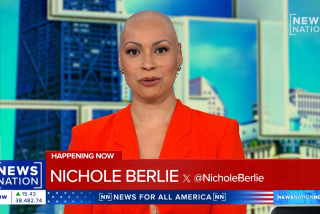Hair Drug Creates Buzz, but Keep Your Hats On
- Share via
I’ve been reflecting a lot lately--especially when bright light shines on the top of my head. My hairline is headed north, and I’m slowly developing a monk-like bare patch at the crown. Which is why in the last few days I’ve spent a few idle moments--OK, about six or seven hours--surfing the Internet to see what options are available these days for men with thinning hair.
Much of the buzz online concerns a remedy that’s not yet available. Earlier this year, the pharmaceutical firm GlaxoSmithKline released preliminary reports about a drug called dutasteride.
According to company officials, this medication works by blocking two enzymes that convert testosterone into a nasty, hair-killing hormone called dihydrotestosterone, or DHT. By comparison, Propecia, the bestselling hair-growth drug in the United States, blocks only one of the enzymes responsible for making DHT.
Several Web sites host message boards that enable bald guys to swap information about hair-growth products. I read lots of messages from men who sounded desperate to try dutasteride. And rumors are flying that the drug could be on the market soon.
Keep your hats on, fellows. A spokesperson for GlaxoSmithKline said that, while early studies are very encouraging, the drug is still being tested and, if eventually approved by the FDA, probably wouldn’t be sold in the United States for hair growth until 2003.
Some men, however, may try to get dutasteride sooner. You see, DHT also causes the prostate to grow, which leads to problems with urinating for some men. And GlaxoSmithKline is also testing dutasteride as a treatment for enlarged prostate, or benign prostatic hyperplasia. Those clinical studies are nearing completion, and the company says dutasteride could receive approval as a prostate drug by the Food and Drug Administration as soon as next year.
Sound familiar, hair hunters? Long before Propecia was approved for sale in 1997, word spread that some bald guys who used the prostate drug Proscar grew hair. That led many men who were losing their locks to ask their doctors for Proscar. Propecia and Proscar are the same drug (generic name: finasteride), though the latter is cheaper and sold in higher doses. Even after Propecia became available, many economically minded skinheads finagled prescriptions for Proscar and chopped up the pills.
Doctors hope men don’t try the same slice-and-dice strategy with dutasteride. “It’s a big mistake,” says Dr. Gary Hitzig, medical director of the American Hair Loss Council in Bethel, Conn. “Most of a pill is filler. There’s only a tiny spot that has the active ingredient.” In other words, chop up a pill and one day you’ll take an excessively high dose of the drug, while on others you’ll swallow nothing but powder. Dutasteride may eventually help some men beat baldness, but trying to beat the system could backfire.
While browsing for hair help, I was surprised by the number of sites I found promoting over-the-counter cosmetic products bearing claims that they “stimulate hair growth” and “prevent hair loss.” After all, to date the FDA has only approved two drugs for sale as baldness remedies--Propecia, which is sold by prescription, and minoxidil, which is available over-the-counter (the best known brand is Rogaine) and at a higher dose by prescription.
It’s illegal for makers of cosmetics containing other ingredients to say that their products grow hair. The Federal Trade Commission has investigated “hundreds of product claims about hair growth,” says Lesley Fair, an attorney for the agency, often forcing companies to refund money to consumers. Due to limited resources, however, the FTC can’t chase down every false claim, says Fair.
Aside from the legal questions, there’s a more basic issue: Do any of these shampoos, conditioners and gels work? Their manufacturers tout a variety of theories about how to prevent baldness. Some claim that their products feed hair growth by dosing the scalp with vitamins and other nutrients.
Other products are said to contain deep-cleaning agents that open up “clogged” hair follicles, allowing these tiny sacs to sprout new hair shafts. My favorite: a line of hair cosmetics containing extracts of calf thymus (which is a gland in the chest) that allegedly prevents white blood cells from attacking hair follicles.
None of these theories makes sense to Hitzig. “Some of these products might be good as scalp conditioners or for general hair care,” he says, “but they have no substantial merit in terms of reversing hair loss.” There is wide agreement in the scientific community about what causes the phenomenon known as male pattern baldness, Hitzig insists. Simply put, DHT causes follicles atop the scalp to shrink and stop making hair. If a man lives long enough, his locks will probably thin at least a little.
According to Hitzig, the percentage of adult men who are losing hair is roughly equal to any given age. That is, 50% of 50-year-olds are either bald or on their way.
Balding men have options beyond the medicine chest, of course. Hair-restoration surgery, weaves and hairpieces all have their advantages and disadvantages. But if you prefer to stick with pills or lotions, a visit with your doctor may help. “Fifteen years ago when patients came to us we had nothing to offer them,” says dermatologist Jerry Shapiro, director of hair research at the University of British Columbia in Canada. “Now we have effective treatments.”
According to published studies, more than 80% of men who use Propecia stop losing their hair; about two-thirds experience mild to moderate new growth. Some men whose tufts are tumbling respond well to Rogaine. Shapiro says it’s important to be realistic. “I emphasize prevention,” he says. “If there’s regrowth, that’s a nice bonus.”
*
Massachusetts freelance writer Timothy Gower can be reached by e-mail at tgower@mediaone.net. The Healthy Man runs the second Monday of the month.






